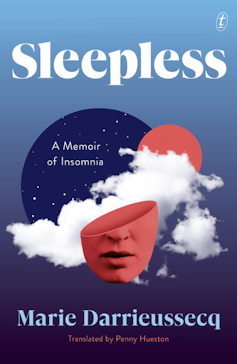A memoir of sleeplessness posits making peace with our ruptured nights – but risks becoming an exhausting read
- Written by Liz Evans, Writer, Author, Journalist, Associate Lecturer in English & Writing:, University of Tasmania

My relationship with sleep is fraught. For me, the journey towards sleep is a precarious one, relying on a shifting portfolio of mental states, and an irritating need for silence.
When I finally sink into oblivion, my rest can be shattered by the sound of my partner breathing, or a hoon tearing down the road at the top of our driveway. Once broken, sleep lies around me in sharp, little pieces, jabbing with the promise of a difficult day ahead.
Review: Sleepless: A Memoir of Insomnia – Marie Darrieussecq (Text Publishing)
When did this start? Was it the heated anxiety of menopause, the interrupted nights of early motherhood, the wide-awake longing for home after moving halfway round the world? When did sleep become so elusive?
I became sensitive to noise in London. I was a music journalist in the 1990s, but sometimes even I needed to sleep and this could be hard with paper-thin walls and drunken neighbours. But did the trouble start even earlier, in adolescence or childhood, I wonder, remembering the volatility in my first home. Did I ever sleep like a baby, even when I was one?
In her new book, Sleepless: A Memoir of Insomnia[1], French writer Marie Darrieussecq embarks on a similar investigation into her own struggle with sleep. Through a hybrid of personal narrative and meditative essays, Darrieussecq contemplates the curse of insomnia with unusual scope. But while she writes like a dream, her work is thrown out of joint by its ambitious scale. Her exhaustive project risks becoming an exhausting read.
Beginning with a tour of literary perspectives and a brief history of barbiturates, Darrieussecq examines the connection between creativity and hyper-vigilance.
Proust and Kafka lead the canon here, and the stories of addiction to Veronal[2] (a powerful barbiturate) and accidental overdose are both fascinating and shocking. But the references rush in thick and fast, and I struggle to keep pace.
Read more: How do I stop my mind racing and get some sleep?[3]
A global industry
The hunt for sleep has become a global industry. Psychologists, doctors, yoga teachers, meditation and breath-work practitioners ply us with sleep apps, mindfulness routines, prescription drugs and natural remedies. Columns and articles clog up the media with tips on How To Sleep, recycling age-old advice in jazzed-up terminology.
At least we have something to occupy us in the small hours.
Herbal teas and melatonin help me drift off, but when I wake up at 2am or 3am, resignation and a book work best. According to my London herbalist, the trick is to break the pattern. With this in mind, he once prescribed me datura[4] a potentially deadly narcotic. Entranced, I left his basement practice with strict instructions and a tiny dark glass bottle. I felt like Alice in Wonderland. It worked, but only for a while.
Perhaps my own struggles with sleep are why no matter how much I appreciate the scholarship of Darrieussecq’s impressive project, I’m most interested in her personal quest. Her desperate encounters with pharmacology, alcohol, and eventually a somnologist (sleep psychiatrist) are the ones that resonate. The love and torture of childbirth and breastfeeding, the problem of the study-bedroom, the relentlessness of the 4.04am waking hour, all have me bristling with recognition and relief.
I Google one of the alluring sleep aids she describes, I’m curious about the sleep test, a polysomnographic examination which involves being fitted with a network of electrodes by a sleep technician, and I’m moved by her account of her addiction to sleeping pills. But these personal vignettes are brief. She opens up pockets of her life, only to shut them back down again, leaving me intrigued and a little dissatisfied.
I want to know more about her childhood, about being born in the years after her brother who did not survive. I wonder if her mother was unable to sleep, due to grief and fear of losing another baby. There doesn’t seem to be an endpoint to this story, which I don’t mind at all because that’s the whole point with insomnia. But I would like to know what happened in the beginning.
A trained psychoanalyst, Darrieussecq is understandably careful. When she walls off her narrative, it’s with a firmness you might expect from someone whose work depends on boundaries. As a qualified psychotherapist myself, I appreciate and respect her need for containment. But as a reader, I prefer it when she’s visible.
Read more: Explainer: what's the link between insomnia and mental illness?[5]

















